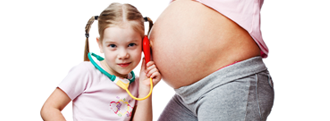Your Child at 6 Months
Pediatric Development Guide for Parents near Gates, NY
The board-certified pediatricians at Westside Pediatrics have provided this pediatric development guide to help educate parents on some of the amazing things their child can do at this age and tips around care including feeding and activities. Call (585) 247-5400 to schedule an appointment at our pediatric office in Rochester, NY.
Download PDF Version
WHAT YOUR BABY CAN DO
At this age your baby can probably:
Roll over both ways…
Hold head steady when sitting up…
Reach for objects, hold them, and throw them down…
Bring everything to his mouth…
Recognize strangers…
Turn when he hears a sound…
Cry when left alone in a room…
Scoot around, bounce, maybe get up on hands and knees…
Imitate sounds…
What you can do with your baby
At this age your baby is probably never still! Try to find time to play with your baby. She may like: banging pots and pans, soft dolls or animals.
Start playing games like pat-a-cake and peek-a-boo with her.
Remember to talk to your baby. Describe things to her: “The stove is hot,” “The ball is under the table.” Start reading to your baby.
Pull her gently to standing. Bounce her on your lap. Repeat the sounds she makes.
Babies need lots of love. Take time to hold your baby and look at her. Introduce a cup.
Being a parent is enjoyable but hard work. There is so much to learn! Sometimes it helps to talk to other parents or get some advice from someone outside the family. If you would like to find out more, call this number and ask about parenting programs in your area.
LIFELINE 274-5151
Looking through your child’s eyes
Get down on your hands and knees and crawl through your house. This is how your child sees the world. That electric socket is at eye level. Low cabinets are just right for opening. Make sure your child’s world is safe.
Helping your 6 month old baby learn
A person’s body is an important part of his or her identity. Even when your baby is only a few months old you can start teaching her the different parts of her body. As you change her diaper, touch your nose and then her nose and say, “See my nose? Here is your nose.” Do the same with eyes, ears and mouth. Show her and tell her the names of her hands , feet and other body parts as well. You can make a game of it and help your baby learn at the same time.
As she gets older, ask her to show you her nose or eyes or other parts of her body.
Kids don’t learn to talk unless you teach them what different things are called.
Safety
10 Tips To A Safe House
Accidents kill more children in the United States than all diseases put together! Don’t let your child be one of them. If you haven’t already, now is the time to safety proof your home. Follow this guide to make your home safe.
- Put all poisons and medicines up high in locked cabinets. This includes: detergents (dishwashing soap) cosmetics (lipstick, perfume, nail polish remover) medicines (aspirin, sleeping pills, prescription, and all other medicines!) vitamins, cleaning fluids (Windex, Comet, bleach and any others) gasoline, turpentine.
- Make sure you have Syrup of Ipecac. This will make your child vomit if he has swallowed poison. Don’t use it until after you call your pediatrician or poison center and they tell you to. You can get Syrup of Ipecac from the drug store or from your pediatrician.
- Make sure doors to dangerous places like the garage or basement are shut and locked. Use spring loaded hinges to insure automatic door closing. These may be purchased at hardware stores.
- Make sure there are no cords dangling where your child might reach them. Try not to use extension cords. Cords are dangerous because your child might chew on them and burn himself.
- Turn your water heater down to 120 degrees F or the lowest setting. This way your child will not get burned by tap water.
- Don’t use space heaters. Many children burn themselves on them. If you do have a space heater, make sure it is somewhere out of the way of your child. In the event of a burn, immediately flush the area with cold water and call your physician.
- Put gates at the top of all staircases. You can buy these gates at a department store.
- Put a smoke alarm on each level of your house. If you are a renter, your landlord MUST provide these for you. If you own your own home, you can buy smoke detectors at a hardware store, department store or drug store.
- Put plug covers in all electric outlets not being used. These are not expensive and you can get them at the grocery store, drug store or hardware store. If you can’t find covers, cover the outlets with heavy tape like making tape or electrical tape.
- Plastic bags, wraps and balloons should never be left where your baby can reach them.
Put the poison hotline number on your telephone: POISON 275-3232
Feeding facts
How is mealtime going? Is your baby eating a variety of different foods? Here are some reminders about feeding your baby at this age:
Initially feed your baby basic foods that are single, (stage 1) like chicken or individual vegetables. The baby foods that come in stages are good choices.
Don’t feed your baby “junior” or toddler foods. He is not ready yet.
Try making your own baby food. Put leftovers through a food processor or blender. You can make servings by freezing them in ice cube trays and thawing them as you need them. This will save you money.
Finger foods are small pieces of food that are soft and mashable or get soggy with moisture such as cheerios Or a small cube of bread. Your baby may be ready to start these when he is close to 8 months old.
Foods to avoid:
- Eggs and foods with eggs, like mayonnaise or custards
- Berries, such as strawberries
- Citrus juices (orange juice is okay after 8-9 months)
- Shellfish
- Tomatoes and sauce
When choosing a cereal, choose a baby food that has iron in it. Try to give your baby a variety of different foods. At this age your baby should be eating 3 meals a day plus snacks.
This is a good time to:
Try to introduce a sippy cup of water. Children at this age do not need sweets (chocolate, ice cream or baby desserts). They reinforce bad dietary habits.
Other things you can do with your baby
At this age your baby may be starting to make more sounds. Usually the first words are “Ba,” “Da” or “Ma”. Is your baby starting to make these sounds? Help him learn to talk by repeating these sounds back to him as he makes them. Soon your baby will say more words!
Now is a good time to introduce a cup to your baby, even if he is not yet ready to drink from it. At mealtime, put a cup on the table. Let your baby play with the cup. If he seems ready, try putting a little bit of formula or water in it. Help him lift the cup to his mouth and drink. Even if your baby is not ready to use a cup all the time, letting him get used to it now will help later when he is ready to switch from bottle or breast to cup.
One way your baby learns is by seeing different things around him. Does your baby spend most of his time in the bedroom or kitchen? Try taking him into different rooms. Also, take him outside or to someone else’s house. Seeing different places will help your baby learn.
Things you may be worried about at 6 months old
Teething
By now your baby’s teeth may have started to come in. The first teeth to come in are the front teeth on the bottom (at 5-7 months), and then the ones on the top (at 6-8 months).
Sometimes teething causes babies to cry a lot, or have a slight fever.
Here are some things you can do to help:
- Rub your baby’s gums with an ice cube wrapped in a washcloth. The cold will feel good to your baby.
- Give your baby something rubbery to chew on. If you don’t have a teething ring, try a plain frozen bagel.
To clean your baby’s new teeth, wipe them off with a damp piece of gauze or a washcloth. Do this twice a day.
Shoes
You may be thinking that it is time to buy your baby some shoes. Wait. Your baby does not need shoes until she starts to walk. At this age, socks with slip proof bottoms are just fine.
COMING ATTRACTIONS
Before your next checkup, your baby may start to:
Smile…
Feed herself a cracker…
Sit without support…
Bear some weight on her legs when held upright…
Parenting can be hard work, but it is also enjoyable. Take the time to enjoy your baby.
Schedule an Appointment
If you have more questions regarding pediatric development milestones or your child’s development, call our pediatric clinic in Rochester, NY at (585) 247-5400 to request an appointment with one of our exceptional pediatricians.




